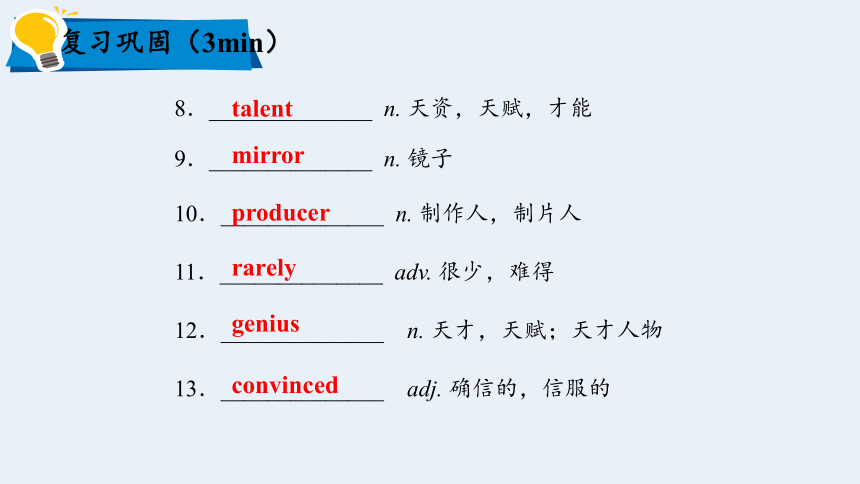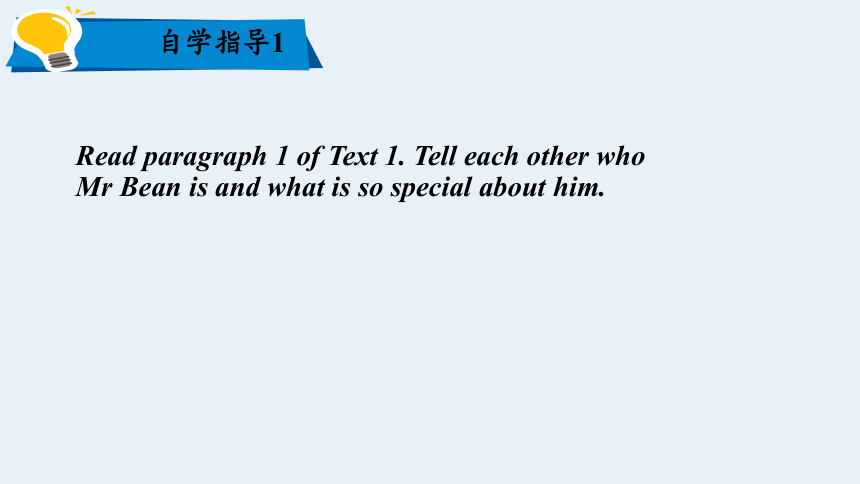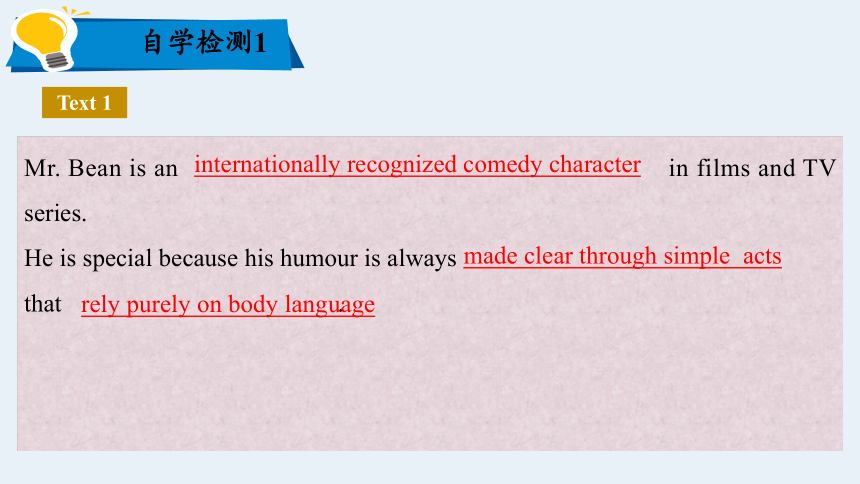北师大版(2019)选择性必修 第二册Unit 4 Humour Lesson3 My Favourite Comedian 课件(19张ppt)
文档属性
| 名称 | 北师大版(2019)选择性必修 第二册Unit 4 Humour Lesson3 My Favourite Comedian 课件(19张ppt) |

|
|
| 格式 | pptx | ||
| 文件大小 | 1.5MB | ||
| 资源类型 | 教案 | ||
| 版本资源 | 北师大版(2019) | ||
| 科目 | 英语 | ||
| 更新时间 | 2023-09-25 12:30:43 | ||
图片预览







文档简介
(共19张PPT)
Unit 4 Humour
Lesson 3 My Favourite Comedian
学习目标
1.获取有关喜剧角色憨豆先生的基本信息,口头介绍憨豆先生
2.阅读并提取关键动词和动词短语,描述憨豆先生餐厅用餐片段
复习巩固(5min)
1.______________ n. 喜剧演员
2.______________ n. 国籍
3.______________ n. 名誉,名望
4.______________ vt. 遇到
5.______________ vt. 使开心;逗笑
6.______________ vi. 依赖
7.______________ n. 正相反
comedian
nationality
reputation
encounter
amuse
rely
contrary
复习巩固(3min)
10.______________ n. 制作人,制片人
11.______________ adv. 很少,难得
12.______________ n. 天才,天赋;天才人物
13.______________ adj. 确信的,信服的
producer
8.______________ n. 天资,天赋,才能
9.______________ n. 镜子
talent
mirror
rarely
genius
convinced
Look at the photo. Answer the questions.
Lead-in
Who is he
What’s he famous for
What’s his nationality
What TV series and films has he acted in
What do you think of his performance
He is Rowan Atkinson.
He is English.
The character Mr Bean he acted.
TV series and films of Mr Bean.
Read paragraph 1 of Text 1. Tell each other who Mr Bean is and what is so special about him.
自学指导1
自学检测1
Text 1
Mr. Bean is an in films and TV series.
He is special because his humour is always that .
internationally recognized comedy character
made clear through simple acts
rely purely on body language
自学指导1:
阅读教材P15 Text1,结合手中学习材料,理解文章大意,完成下列两个小题。
一、画出下列短语并将汉语意思写在导学案上(3min)。
1.______ _____ ___ 有...的名声
2.___ ___________ 依赖
3.______ ________ 尝试
4._____ _________ 一系列
5._____ _________ 高档餐厅
have a reputation for
rely on
make an attempt to
a series of
a fancy restaurant
自学指导1:
阅读教材P15 Text2,结合手中学习材料,理解文章大意,完成下列两个小题。
一、画出下列短语并将汉语意思写在导学案上(3min)。
1. be in for .
2. on the contrary .
3. believe in .
4. boarding school .
5. pull a face .
肯定会经历
相反
相信
寄宿学校
做鬼脸
自学指导2:小组讨论,根据提示将下列副词分类(4min)
Adverbs
Categories of Adverbs Adverbs
Adverbs of Time
Adverbs of Manner
Adverbs of Degree
Adverbs of Frequency
______________________________________________________________________________________________________
__________________________________
later
quickly happily
truly purely
constantly rarely
later quickly constantly happily truly rarely purely
Adverbs Adverbs modify or tell us more about a verb, an adjective or another adverb.副词用来修饰动词、形容词或其他副词。
She speaks softly. (tells us more about the verb “speaks”)She is very beautiful. (tells us the degree of the adjective “beautiful”)She runs extremely fast. (tells us the degree of the adverb “fast”)
Adverbs usually answer the questions of how, where, when, how often and to what extent.
副词通常表示方式、地点、时间、频率和程度
Types of adverbs What it does Examples
Adverbs of manner方式副词
Tell us how something is done happily, sadly, loudly, softly, quickly, easily, carelessly
Adverbs of place地点副词
Tell us where something takes place here, there, behind, inside, outside
Adverbs of time时间副词
Tell us when something takes place yesterday, tomorrow, soon, immediately, now
Adverbs of frequency频率副词
Tell us how often something is done seldom, never, often, rarely, always, usually, occasionally
Adverbs of degree程度副词
Tell us the extent or degree to which something is done very, extremely, absolutely, hardly, too, quite
Adverbs of manner tell us how something is done:
方式副词表示一件事情是如何做的:
Liu sings beautifully. (tells us how Liu sings)
The little girl played happily. (tells us how the little girl played)
Adverbs of place tell us where something takes place:
地点副词表示事情发生的地点:
The party will take place here. (tells us where the party will take place)
They ran outside. (tells us where they ran)
Adverbs of time tell us when something takes place:
时间副词表示事情发生的时间:
We saw the film yesterday. (tells us when we saw the film)
They will arrive soon. (tells us when they will arrive)
Adverbs of frequency tell us how often something takes place:
频率副词表示事情发生的频率:
We visit our family often. (tells us how frequently we visit our family)
We rarely go to town. (tells us how frequently we go to town)
Adverbs of degree tell us to what extent something is done:
程度副词表示事情发展的程度:
They were very pleased with the results. (tells us to what extent they were pleased)
He was absolutely delighted with the outcome. (tells us to what extent he was delighted)
later quickly constantly happily truly rarely purely
We don’t like snow so we ________ go skiing.
She’s very worried so she _________ asks where her mother is.
That paining is ________ beautiful! Amazing!
When Helen got her new ballet shoes, she smiled, put them on and danced around ________.
I could tell, ________ by the look on his face, that he was disappointed.
The rain was pouring down so we ________ ran inside.
She _______ wrote warmly of his delightful words and behaviour.
rarely
constantly
truly
happily
purely
quickly
later
当堂检测1
当堂检测2
1 Why does Mr Bean go to a fancy restaurant on this particular day
2 Does Mr Bean have many friends How do you know
3 Why does Mr Bean order “steak tartare”
**4. Mr Bean is a very popular TV series in Britain.Do you think people like it just for fun Is there any underlying meaning behind this TV series
通过阅读文章,用英文回答以下三个小题
当堂检测答案
1 Why does Mr Bean go to a fancy restaurant on this particular day
To celebrate his birthday.
2 Does Mr Bean have many friends How do you know
Mr Bean doesn’t have any friends. He goes to the restaurant alone and writes a card
to himself but he pretends he receives this card.
3 Why does Mr Bean order “steak tartare”
Steak tartare is the only dish he could pay for.
当堂检测答案
4. Mr Bean is a very popular TV series in Britain.Do you think people like it just for fun Is there any underlying meaning behind this TV series
Apart from fun,people like it because it conveys ordinary people’s life vividly,especially the
the awkward moments,often with good intentions but bad results.The meaning behind it might be life is good despite the imperfections.
Fancy restaurant reflects the ordinary people’s life,but Mr Bean still enjoys his life.
Thank You
Unit 4 Humour
Lesson 3 My Favourite Comedian
学习目标
1.获取有关喜剧角色憨豆先生的基本信息,口头介绍憨豆先生
2.阅读并提取关键动词和动词短语,描述憨豆先生餐厅用餐片段
复习巩固(5min)
1.______________ n. 喜剧演员
2.______________ n. 国籍
3.______________ n. 名誉,名望
4.______________ vt. 遇到
5.______________ vt. 使开心;逗笑
6.______________ vi. 依赖
7.______________ n. 正相反
comedian
nationality
reputation
encounter
amuse
rely
contrary
复习巩固(3min)
10.______________ n. 制作人,制片人
11.______________ adv. 很少,难得
12.______________ n. 天才,天赋;天才人物
13.______________ adj. 确信的,信服的
producer
8.______________ n. 天资,天赋,才能
9.______________ n. 镜子
talent
mirror
rarely
genius
convinced
Look at the photo. Answer the questions.
Lead-in
Who is he
What’s he famous for
What’s his nationality
What TV series and films has he acted in
What do you think of his performance
He is Rowan Atkinson.
He is English.
The character Mr Bean he acted.
TV series and films of Mr Bean.
Read paragraph 1 of Text 1. Tell each other who Mr Bean is and what is so special about him.
自学指导1
自学检测1
Text 1
Mr. Bean is an in films and TV series.
He is special because his humour is always that .
internationally recognized comedy character
made clear through simple acts
rely purely on body language
自学指导1:
阅读教材P15 Text1,结合手中学习材料,理解文章大意,完成下列两个小题。
一、画出下列短语并将汉语意思写在导学案上(3min)。
1.______ _____ ___ 有...的名声
2.___ ___________ 依赖
3.______ ________ 尝试
4._____ _________ 一系列
5._____ _________ 高档餐厅
have a reputation for
rely on
make an attempt to
a series of
a fancy restaurant
自学指导1:
阅读教材P15 Text2,结合手中学习材料,理解文章大意,完成下列两个小题。
一、画出下列短语并将汉语意思写在导学案上(3min)。
1. be in for .
2. on the contrary .
3. believe in .
4. boarding school .
5. pull a face .
肯定会经历
相反
相信
寄宿学校
做鬼脸
自学指导2:小组讨论,根据提示将下列副词分类(4min)
Adverbs
Categories of Adverbs Adverbs
Adverbs of Time
Adverbs of Manner
Adverbs of Degree
Adverbs of Frequency
______________________________________________________________________________________________________
__________________________________
later
quickly happily
truly purely
constantly rarely
later quickly constantly happily truly rarely purely
Adverbs Adverbs modify or tell us more about a verb, an adjective or another adverb.副词用来修饰动词、形容词或其他副词。
She speaks softly. (tells us more about the verb “speaks”)She is very beautiful. (tells us the degree of the adjective “beautiful”)She runs extremely fast. (tells us the degree of the adverb “fast”)
Adverbs usually answer the questions of how, where, when, how often and to what extent.
副词通常表示方式、地点、时间、频率和程度
Types of adverbs What it does Examples
Adverbs of manner方式副词
Tell us how something is done happily, sadly, loudly, softly, quickly, easily, carelessly
Adverbs of place地点副词
Tell us where something takes place here, there, behind, inside, outside
Adverbs of time时间副词
Tell us when something takes place yesterday, tomorrow, soon, immediately, now
Adverbs of frequency频率副词
Tell us how often something is done seldom, never, often, rarely, always, usually, occasionally
Adverbs of degree程度副词
Tell us the extent or degree to which something is done very, extremely, absolutely, hardly, too, quite
Adverbs of manner tell us how something is done:
方式副词表示一件事情是如何做的:
Liu sings beautifully. (tells us how Liu sings)
The little girl played happily. (tells us how the little girl played)
Adverbs of place tell us where something takes place:
地点副词表示事情发生的地点:
The party will take place here. (tells us where the party will take place)
They ran outside. (tells us where they ran)
Adverbs of time tell us when something takes place:
时间副词表示事情发生的时间:
We saw the film yesterday. (tells us when we saw the film)
They will arrive soon. (tells us when they will arrive)
Adverbs of frequency tell us how often something takes place:
频率副词表示事情发生的频率:
We visit our family often. (tells us how frequently we visit our family)
We rarely go to town. (tells us how frequently we go to town)
Adverbs of degree tell us to what extent something is done:
程度副词表示事情发展的程度:
They were very pleased with the results. (tells us to what extent they were pleased)
He was absolutely delighted with the outcome. (tells us to what extent he was delighted)
later quickly constantly happily truly rarely purely
We don’t like snow so we ________ go skiing.
She’s very worried so she _________ asks where her mother is.
That paining is ________ beautiful! Amazing!
When Helen got her new ballet shoes, she smiled, put them on and danced around ________.
I could tell, ________ by the look on his face, that he was disappointed.
The rain was pouring down so we ________ ran inside.
She _______ wrote warmly of his delightful words and behaviour.
rarely
constantly
truly
happily
purely
quickly
later
当堂检测1
当堂检测2
1 Why does Mr Bean go to a fancy restaurant on this particular day
2 Does Mr Bean have many friends How do you know
3 Why does Mr Bean order “steak tartare”
**4. Mr Bean is a very popular TV series in Britain.Do you think people like it just for fun Is there any underlying meaning behind this TV series
通过阅读文章,用英文回答以下三个小题
当堂检测答案
1 Why does Mr Bean go to a fancy restaurant on this particular day
To celebrate his birthday.
2 Does Mr Bean have many friends How do you know
Mr Bean doesn’t have any friends. He goes to the restaurant alone and writes a card
to himself but he pretends he receives this card.
3 Why does Mr Bean order “steak tartare”
Steak tartare is the only dish he could pay for.
当堂检测答案
4. Mr Bean is a very popular TV series in Britain.Do you think people like it just for fun Is there any underlying meaning behind this TV series
Apart from fun,people like it because it conveys ordinary people’s life vividly,especially the
the awkward moments,often with good intentions but bad results.The meaning behind it might be life is good despite the imperfections.
Fancy restaurant reflects the ordinary people’s life,but Mr Bean still enjoys his life.
Thank You
同课章节目录
- Unit 4 Humour
- Lesson 1 What’s So Funny?
- Lesson 2 Why Do We Need Humour?
- Lesson 3 My Favourite Comedian
- Unit 5 Education
- Lesson 1 Enlightening a Mind
- Lesson 2 The Objectives of Education
- Lesson 3 Understanding
- Unit 6 The Media
- Lesson 1 From Page to Screen
- Lesson 2 Questions about Media
- Lesson 3 The Advertising Game
